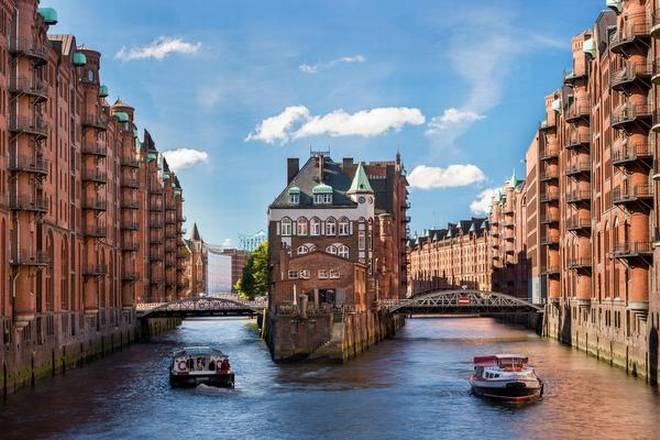The first time I visited Hamburg, the city gave me too much fodder for weather-talk. I even learnt the phrase Schmuddelwetter, dedicated to the entire region of North Germany. The somewhat untranslatable phrase simply means damp, hence wet and muddy weather, and it’s intended as an insult to the city’s perpetually, and unpredictable, drizzling skies and whooshing cold winds.
On the same trip, I also went looking for the pubs in which the once-smalltime band called The Beatles played in the 1960s. (Unfortunately, not many pubs were preserved as cultural relics and have gone out of business since.) More seriously, I was on a fellowship to the media capital of Germany that took me on a tour of the offices of the city’s renowned magazines and television studios.
The second time, I was in the city on a rather hipster-ish pursuit — to attend an indie magazine workshop. And so, in the erstwhile warehouses of the port city, now refurbished as artsy workspaces, bleached blonde youngsters in their 20s, in geeky glasses, man (and woman) buns and beards meddled with their computer screens over bottles of mineral wassermit gas (sparkling water, if you will) on how to create an indie magazine in five days. Over and above creating a print magazine, this year the idea is also to create an augmented reality magazine, the world’s first, and the former freight train warehouse area of Oberhafen will play host to it.
They want to push the boundaries of publishing by exploring alternative ways. By the end of the workshop, “Oberhafen could become the first prototype edition of an augmented reality magazine,” the brochure speculated. It bears mention that the offices of Germany’s unequivocally popular weekly magazine Der Spiegel sitnot too far from Oberhafen itself. Staunchly old-school with falling subscription that boasted of a million subscribers once, Spiegel’s transition to digital has been reluctant and recent. But those are the contrasts Hamburg is used to.
“Hamburg has a strong bourgeoisie and an even stronger alternative scene (as you have seen during the violent G20 riots). But the city is also divided — on one hand, it’s very affluent with the old money earned from trading, shipping etc, while on the other, some quarters are extremely poor,” Martin, a bespectacled bicycle rider, who works in the city’s administrative offices told me.
With waterfront facing row houses and fancy Porsches in their front yards, the quarters in the west Blankenese and Nienstedten are extremely rich. As your S-bahn train moves east, graffiti dominates the walls of public housing and doner kebab stalls outnumber hipster cafés in neighbourhoods like Jenfeld and Billbrook, signalling economic inequality.
Hamburg straddles the dichotomies of being rich and being woke rather splendidly. When the nationwide anti-racism protests were held all over Germany — following the right-wing uprising in the east German city of Chemnitz that refused to die down — young Hamburgers came out in large numbers flashing orange banners that read ‘refugees welcome’. Now there are plays in Hamburg’s theatres whose central theme is, ‘theatre against right extremism.’ Speaking of which, the city’s most recent landmark, its flashy concert hall on the banks of the Elbe river called Elbphilharmonie opened a year ago after overshooting the budget and timelines by years.
Swaying east
But delays in public projects and anti-racism protests notwithstanding, business is, otherwise, as usual in Europe’s second-busiest port city. Even as the Tweeter-in-Chief increasingly alienates Europe and China by fuelling and refuelling the trade war, dismantling global trade relations, Hamburg has been quietly swaying east and courting China and India on its own. A decade old event called China Time, “presents Hamburg as an ideal location for an interaction with China to a broad audience,” according to its website. In the same vein, the yearly India Week event, attracted more than 30,000 visitors in 2015.
Back in my workshop — no rains this time, thanks in no small part to the unusual heat wave battering Germany — I pitch the idea of the rich-poor divide in Hamburg to the magazine we’re producing. With too little time to research and produce, the story didn’t get picked up. Which is just as well, because instead, I’m handed a story on how vipassana expands your mind. It’s perhaps the most obvious (and stereotypical) assumption to make that an Indian in an all-Caucasian crowd has some kind of vipassana experience but I’m happy to put on record that I volunteered to do it.
Rich-poor divide, housing crunch, gentrification — the same problems that haunt other rich and developed European cities haunt Hamburg as well as the cities evolve continuously. In Martin’s words: “The city tries to balance the rich-poor divide, but it’s not so easy. But, most Hamburgers (and even newcomers) are really proud of their “home harbour.” Schmuddelwetter or otherwise.
The Stuttgart-based writer is as happy on the road as he is tending to his houseplants, which often breed fruit flies.








